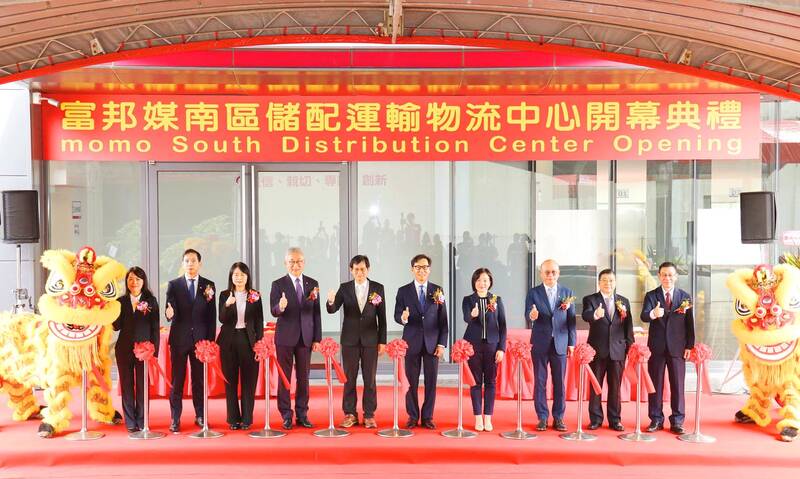Momo.com Inc (富邦媒體) opened its southern distribution center in Tainan’s Sinshih District (新市) yesterday, as the e-commerce operator continues to strengthen its logistics infrastructure, aiming to further differentiate its service not only from online competition, but also brick-and-mortar retailers.
Construction of the southern distribution center on a site covering 24,500 ping (80,972.5m2) started in 2021.
The company plans to build six floors above ground and one below, investing about NT$3 billion (US$92.3 million) in the center, Momo.com said in a statement.

Photo courtesy of Momo.com Inc
The new distribution center has the capacity to process 160,000 packages per day and could store as many as 3.4 million packages, the company said, expecting it to help shorten the lead time for packages delivered in Yunlin County, Chiayi County, Tainan, Kaohsiung and Pingtung County.
Apart from ensuring quality, speedy service for consumers in southern Taiwan, the new distribution center is expected to help achieve fair distribution of delivery tasks between northern and southern Taiwan and reduce distribution costs, while lowering energy consumption for transportation and cutting carbon emissions in the region, the company said.
In addition, the new center is expected to assist the development of local industries, as well as create 500 job opportunities in logistics, data analysis, research and development, and warehouse system in the region, it said.
Momo.com, which operates three platforms — online shopping, TV home shopping and catalog shopping — enjoys a steady share of 16.5 percent of Taiwan’s online retailing market, according to a Fubon Securities Investment Services Co (富邦投顧) estimate.
“With the launch of the southern distribution center, Momo’s warehouse area is estimated to have increased by 15 percent compared with the same period last year. The company’s market share is expected to increase through better logistics services, which will also strengthen its competitiveness,” Fubon Securities said in a statement on Nov. 5.
Momo.com early this month reported its third-quarter revenue hit a record NT$25.55 billion, up 1.9 percent year-on-year, thanks to its greater logistics efficiency and a wider range of product offerings compared with local peers.
However, lower consumer purchases, rising market competition and higher operating expenses earmarked for new businesses affected the company’s bottom-line, with net profit falling 11.2 percent to NT$666 million and earnings per share (EPS) dropping 11.1 percent to NT$2.64, lower than consensus estimates of NT$788 million in net profit and NT$3.27 for EPS, according to data compiled by Bloomberg.
Gross margin decreased 0.34 percentage points to 8.92 percent and operating margin fell 0.42 percentage points to 3.22 percent from a year earlier, company data showed.
Overall, Momo.com’s cumulative revenue in the first three quarters of this year hit a record NT$76.41 billion, up 3.5 percent annually, but net profit over the period fell 5.6 percent to NT$2.34 billion and EPS declined to NT$9.29 from NT$11.04, data showed.

To many, Tatu City on the outskirts of Nairobi looks like a success. The first city entirely built by a private company to be operational in east Africa, with about 25,000 people living and working there, it accounts for about two-thirds of all foreign investment in Kenya. Its low-tax status has attracted more than 100 businesses including Heineken, coffee brand Dormans, and the biggest call-center and cold-chain transport firms in the region. However, to some local politicians, Tatu City has looked more like a target for extortion. A parade of governors have demanded land worth millions of dollars in exchange

An Indonesian animated movie is smashing regional box office records and could be set for wider success as it prepares to open beyond the Southeast Asian archipelago’s silver screens. Jumbo — a film based on the adventures of main character, Don, a large orphaned Indonesian boy facing bullying at school — last month became the highest-grossing Southeast Asian animated film, raking in more than US$8 million. Released at the end of March to coincide with the Eid holidays after the Islamic fasting month of Ramadan, the movie has hit 8 million ticket sales, the third-highest in Indonesian cinema history, Film

Taiwan Semiconductor Manufacturing Co’s (TSMC, 台積電) revenue jumped 48 percent last month, underscoring how electronics firms scrambled to acquire essential components before global tariffs took effect. The main chipmaker for Apple Inc and Nvidia Corp reported monthly sales of NT$349.6 billion (US$11.6 billion). That compares with the average analysts’ estimate for a 38 percent rise in second-quarter revenue. US President Donald Trump’s trade war is prompting economists to retool GDP forecasts worldwide, casting doubt over the outlook for everything from iPhone demand to computing and datacenter construction. However, TSMC — a barometer for global tech spending given its central role in the

Alchip Technologies Ltd (世芯), an application-specific integrated circuit (ASIC) designer specializing in server chips, expects revenue to decline this year due to sagging demand for 5-nanometer artificial intelligence (AI) chips from a North America-based major customer, a company executive said yesterday. That would be the first contraction in revenue for Alchip as it has been enjoying strong revenue growth over the past few years, benefiting from cloud-service providers’ moves to reduce dependence on Nvidia Corp’s expensive AI chips by building their own AI accelerator by outsourcing chip design. The 5-nanometer chip was supposed to be a new growth engine as the lifecycle